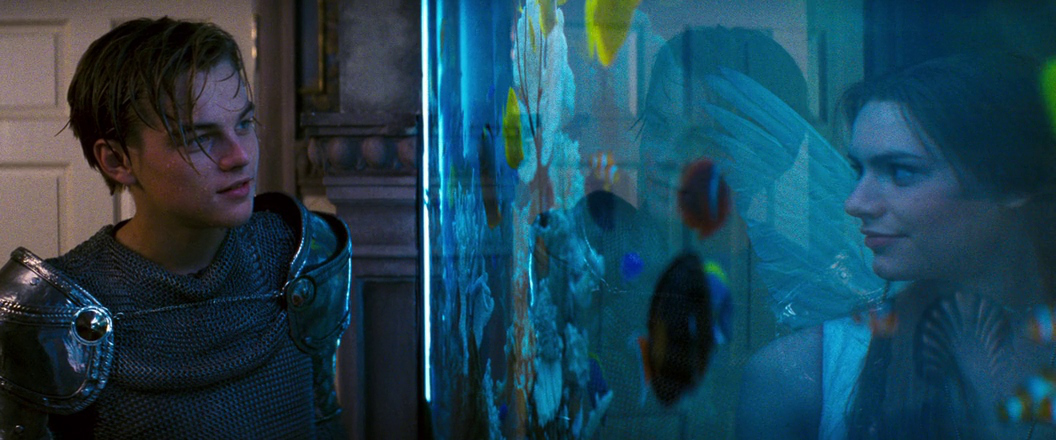The year is 2010. A young Liv is sat at the back of her English classroom. Baz Luhrmann’s ‘Romeo + Juliet’ (1996) is being projected onto the whiteboard. Everyone stares at the film with various expressions of indifference on their faces. You can taste boredom in the air. The teacher insists on replaying the opening scene several times as this is the topic of the lesson.
The internal voice in Liv’s head: I hate this. Why are they wearing such strange clothes? I don’t understand what they’re saying. This isn’t normal…What time’s lunch?
Ok, you get the idea. My first encounter with this film wasn’t a good one because it was just very confusing. The language seemed so strange, the camera movements were fast and jerky, and I didn’t like the harsh colours of the Hawaiian t shirts worn by the Montague boys. It was brash and bold and unlike anything I’d ever scene before. We had to watch the garage scene over and over again, to the point where it was painful. I think we watched the rest of the film too, but I can’t really remember – I probably didn’t like it anyway.

Flashforward to the present.
Over the summer I watched Baz Luhrmann’s Strictly Ballroom (1992) and fell in love with it; the style of filming was captivating, and it really felt like a cinematic escape. Immediately I wanted to watch more of his films, which meant the inevitable return to Romeo + Juliet – maybe I would appreciate it more after seven years of filmic (yes that is a word, I checked) education.
Answer: I definitely did.

Luhrmann takes this legendary play with its associations of stuffy classrooms and confusing archaic language and he propels it into a slightly dystopian 90s universe, and like when you place two complementary colours together, this contrast makes the film zing. This juxtaposition of old and new isn’t just limited to the language (Luhrmann remained loyal to the play’s original dialogue), it is a theme which weaves itself throughout the film. Each gun is named after a different type of sword, evoking the weaponry used in the traditional performances, quotes for Shakespeare are used in the billboard adverts for Coca-Cola and in the final scene the church is decorated with neon crucifixes, combining ancient and contemporary elements. The play is a time traveller; it itself remains the same but the world around it has totally changed.

This time around I had no complaints; I didn’t mind the swift camera movements or the excessive costumes, in fact, I appreciated the intense visual experience that they created. The auditory aspects of the film immerse you into Luhrmann’s world as well; while you’re trying to unravel the meaning of Shakespeare’s famous words you’re also being bombarded with the crème de la crème of 90s chart hits. Violent delights indeed.
I recently showed the trailer to a friend and unsurprisingly she wasn’t a fan. Like me seven years ago, she found it too excessive and confusing. Afterwards we watched a trailer for a different adaptation which was much more traditional, although some might call it safe. Now that, I hated.
‘Young Hearts Run Free’ by Kym Mazelle plays as Liv exits the stage.

All images taken from: https://film-grab.com/2015/02/24/romeo-juliet/
Author: Liv Clarke
More on Twitter: @Projet_Culturel
GTAA: @Grooviertimes

